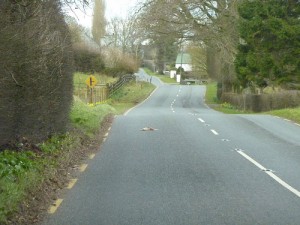
A pair of Michigan state senators hope that lessening the paperwork involved with picking up roadkill will promote composting and (yum!) cooking the critters. Photo: Flickr/Sean MacAntee.
Michigan state Sen. Darwin Booher, R-Evart, wants you to keep your roadkill — please.
A bill by Booher and Sen. John Pappageorge, R-Troy, would relax the rules for claiming roadkill.
Booher said he drafted the bill after constituents asked for simpler, quicker protocol than current Department of Natural Resources (DNR) requirements.
“Some people said they’d see animals lying on the side of the road that they could use in their compost piles instead of stinking up the side of the road,” he said. “Why not make it easier?”
The bill would give first dibs to the driver who hits the animal.
To claim roadkill now, the person interested in keeping the carcass must wait for a DNR permit — called a salvage tag — before moving it, said Russ Mason of the DNR Wildlife Division. Law enforcement officers can issue permits.
Booher’s bill would also allow claimants to bypass the permit if they keep a written record of when and where they took possession of the animal. Law enforcement officers can request to see the records at any time.
A DNR permit would be necessary only for commercial taxidermy or tanning.
It would still be illegal to keep endangered and protected animals such as loons or cougars without federal or state clearance to use the carcass for educational or scientific purposes.
Booher said making the process easier and quicker would encourage people to keep their roadkill.
“Often the carcass just lays there until car after car smashes it into a smelly sight people don’t want to see,” he said. “If someone would rather salvage that carcass for fur or meat or compost, we should absolutely be encouraging that.”
But Mason, of the DNR, says the process is already simple enough.
“Any fool can get a permit,” he said. “If you hit a deer or you see an unclaimed deer and you want to keep it, you just call law enforcement and they get your permit.”
Mason said that although he doesn’t oppose the legislation, he doesn’t understand the need for it.
Permits help the DNR track animal population trends, he added.
Jim Iwanicki of the Marquette County Road Commission doesn’t agree.
“Here in the U.P. and other rural areas, it’s not always the easiest and quickest thing to get a law officer to come bring your permit,” said Iwanicki. “This would make it a lot easier.”
Iwanicki’s agency, like many road commissions across Michigan, receives numerous calls to move or dispose of unwanted roadkill.
But many commissions have difficulty sending workers to handle roadkill because of downsized staffs and budget problems, said Monica Ware of the County Road Association of Michigan.
Iwanicki said that’s why he supports Booher’s legislation — every call to clean up roadkill costs more time and money.
“Anything that promotes people taking the animals and cutting down those calls would be good for us,” he said.
The bill is in the Senate Natural Resources, Environment and Great Lakes Committee.
Pingback: BRIAN MCVEIGH » MI bill aims to turn roadkill into roadside cuisine
Thanks to Michigan state Sen. Darwin Booher, R-Evart will be helping our local White Lake area violators network now able to claim their deer easier saying it was a road kill. The law enforcement officers can request to see the records at any time, but the meat will be processed by then with the kill shot evidence missing.
Don’t put roadkill in your compost pile unless you want all of the loose neighborhood critters making a mess of your garden or wherever you keep your compost!
And, by the way, unless dead animals are buried at least several feet deep those same critters may dig them up. I have had to bury dead cats and dogs at least 24 – 30″ deep so critters have a hard time smelling them.
By the way, I have heard of a great idea for reusing smaller road kills (coon size or smaller, usually). IF you happen to have a fish pond, create a hardware cloth “cage” to put the animal in and put it above the pond, perhaps using some sort of posts or on a floating, anchored platform with a hole in the center. Make sure the roadkill does not touch the side of the cage. Then, as the roadkill “ripens” flies lay their eggs in the carcass and when the maggots eventually crawl out they will fall into the pond and become fish food.